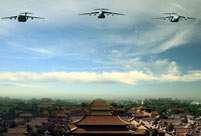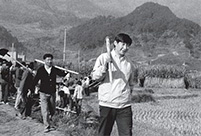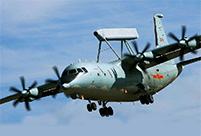 Top 100 beauties in the world!
Top 100 beauties in the world!
 Gallery: Who is the most beautiful one?
Gallery: Who is the most beautiful one?
 If you like autumn, put your hands in the air!
If you like autumn, put your hands in the air!
 Fan Bingbing's "Queen style" in new play
Fan Bingbing's "Queen style" in new play
 Lingerie show at 2014 Miss China
Lingerie show at 2014 Miss China
 J-10 fighters show aerobatic stunts in smog-free sky
J-10 fighters show aerobatic stunts in smog-free sky
 Charming contestants of Shanghai Int’l Model Contest
Charming contestants of Shanghai Int’l Model Contest
 Most amazing chi-pao beauties
Most amazing chi-pao beauties
 7 deadly animal attacks
Russia to launch 70 Proton rockets by 2020: official
7 deadly animal attacks
Russia to launch 70 Proton rockets by 2020: officialBOSTON, Nov. 26 -- Nearly 150 years after thousands of Chinese workers, some sacrificing lives, laid tracks over treacherous terrain to build America's first transcontinental railroads, China is playing a new role in the U.S. railway market in an entirely different way: providing technology, management and hiring American workers to assemble the subway cars.
The China CNR Corporation Ltd, China's largest railway equipment maker, has recently won bidding of 284 metro vehicles worth 567 million U.S. dollars to equip the red line and orange line subway in Boston.
It allows CNR to leave its first footprint in North America, a market that it has been longing for a share for years. It also breaks ground for Chinese train makers whose overseas push, backed by Premier Li Keqiang, has been mostly limited to developing markets.
HISTORIC ORDER
The 117-year Boston subway, American's oldest, serves as the lifeline for commuters in the most densely populated city in the New England area. Daily ridership of the red line and orange line, which run through the financial district and Harvard University, exceed 1.3 million.
With facilities turning old-fashioned and the extreme weather frequent, the subway system has been much complained for its delays especially during rush hours in the snowy winter mornings.
Johnathan Davis, the Deputy General Manager of the Massachusetts Department of Transportation (DOT), told Xinhua that as a daily rider of the subway, he saw cars need replacement in spite of some piecemeal rehabilitation. "Being up to more than 40 years old, they have just about to reach the end of their useful lives," he added.
But there are no heavy rail vehicle manufacturers in the United States, he noted. "We have choice of five bidders. CNR offers good techniques and reasonable price," he said, anticipating the new cars would better cope with the growing ridership.
"When rush hour hits, the old vehicles suck. I'm looking forward to the new cars from China," Catherine Chen, a subway commuter, told Xinhua.
According to the DOT, CNR got two "goods" and three " acceptables" in the technical proposal evaluation, outperforming its rivals such as Bombardier. It offered the lowest price, or 567 million U.S. dollars, about half of what Bombardier priced.
Lu Xiwei, president of CNR MA, a joint-venture that CNR creates to take care of this project, told Xinhua that the successful bidding partly owes to the smart price offer strategy. While critics doubt CNR could ensure quality at such a low cost, Lu underlined quality control is CNR's "hard pass" in America.
Europe and Japan require the maximum pressure resistance of the subway cars to be less than 100 tonnes, and even for high-speed railways, it is about 120 tonnes. However, the United States requires 340 tonnes, standard much higher than that of Europe and Japan. In addition, the vehicles should remain in shape even if its floor panel is caught on fire for 45 minutes.
"It's about people's lives. We will do everything we can to meet the standards," Lu said.
40 PERCENT MADE IN CHINA, 60 PERCENT MADE IN USA
Since DOT uses state funding to buy the vehicles, and the Buy American Act requires 60 percent of the parts to come from the United States in government procurement. Therefore, the CNR plans to invest 60 million dollars to build a manufacturing facility in Springfield, 90 miles southwest of Boston, to assemble the vehicles.
The factory will provide 150 manufacturing jobs and 100 construction jobs. Workers will be trained in the CNR's Changchuan factory in China.
"We used to consider renting a factory in Massachusetts. However, for a long-term strategy, it is worthwhile to build a factory," Lu said.
As 40 percent of the vehicles are made in China and 60 percent are made in United States, Lu said it is a pretty good win-win.
(For the latest China news, please follow @PDChina on Twitter at http://www.twitter.com/PDChina and @PeoplesDaily on Facebook at http://www.facebook.com/PeoplesDaily) "We do not have to fuss about whether it is purely made in China or America. A truly global company provides knowledge, management expertise, not simply labor," he said.
He noted high-speed railway bidding in America requires 100 percent of the parts to come from America, but that does not stop Chinese companies desiring to enter this market. It's a good chance to sharpen their technical standards and management, more importantly, their ability to run a venture in a foreign country, he said.
Challenges have emerged. DOT underscored strong participation of minority groups and women-owned business enterprises in the construction of the Massachusetts facility.
CNR MA has utilized two local firms to help them conduct outreach to those communities and held workshops to maximize participation. CNR is also seeking a culture liaison to coordinate throughout the project period.
"We never had these problems. But to become a truly global company, we have to face up to them and it is our must choice," Lu said.
"There will be some learning curves for CNR, and they have done a lot of homework already," Davis said, believing CNR cars will speak to themselves.
C Fred Bergsten, a senior fellow of Peterson Institute of International Economics, a Washington-based think tank, told Xinhua that Chinese companies could make big contributions to the U.S. transportation infrastructure market. China should join the Government Procurement Agreement of the World Trade Organization as early as possible to secure more contracts in America, he said.
(For the latest China news, please follow @PDChina on Twitter at http://www.twitter.com/PDChina and @PeoplesDaily on Facebook at http://www.facebook.com/PeoplesDaily)
 Female soldiers
Female soldiers Celebrity goddesses
Celebrity goddesses  Official trailer of Y-20
Official trailer of Y-20 Photos: Xi Jinping in Fujian
Photos: Xi Jinping in Fujian Standard faces for each countries
Standard faces for each countries China-made military transport aircraft gets ready
China-made military transport aircraft gets ready World Pole Dance Championship in China
World Pole Dance Championship in China 59-year-old Liu Xiaoqing still looks stunning
59-year-old Liu Xiaoqing still looks stunning  Shocking! Photos of Chinese fighters revealed
Shocking! Photos of Chinese fighters revealed Mainland attitude sealed fate of HK protest
Mainland attitude sealed fate of HK protest Ignorance, psychological concerns surround AIDS phobia
Ignorance, psychological concerns surround AIDS phobia A cure for isolation
A cure for isolation CNPC to sell oil field stakes: report
CNPC to sell oil field stakes: reportDay|Week|Month